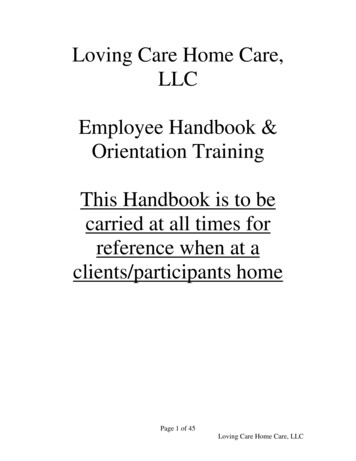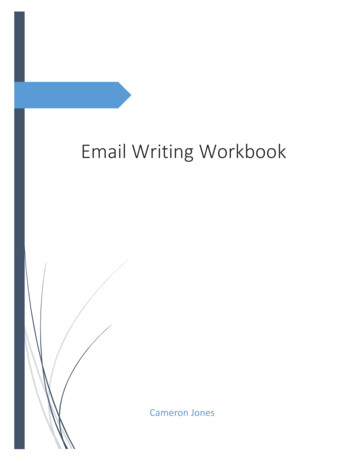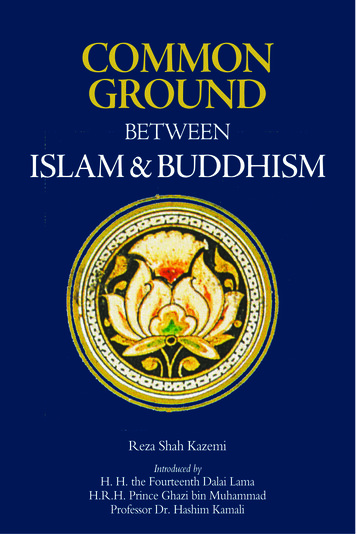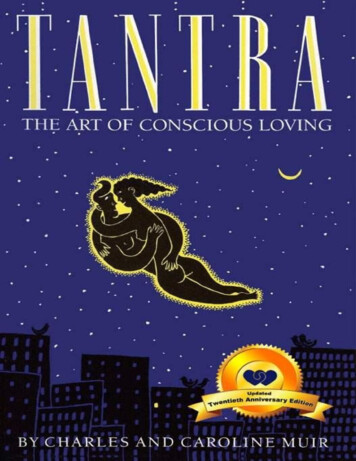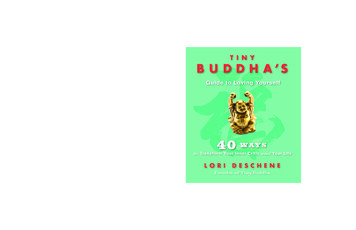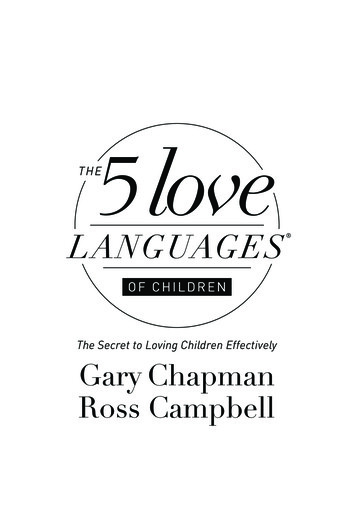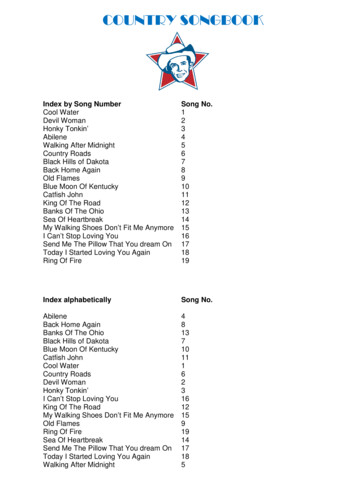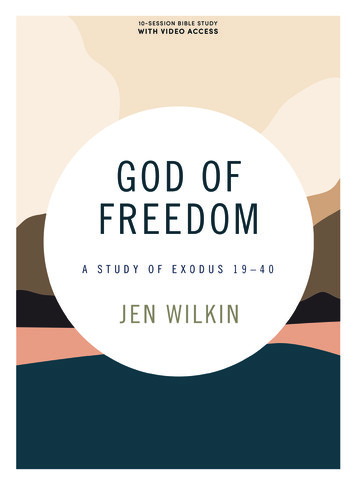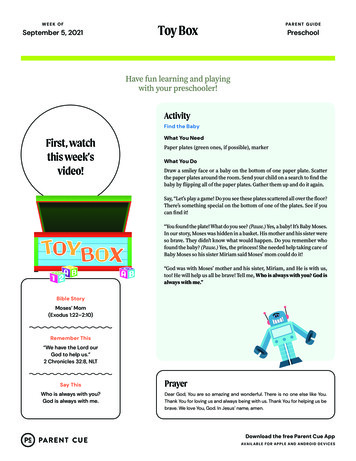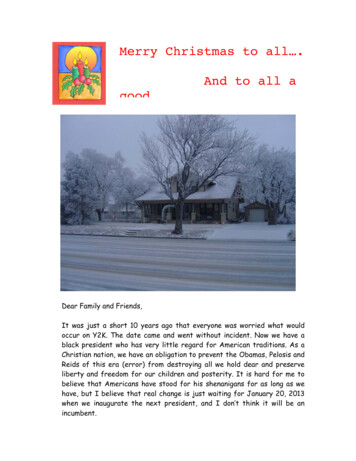
Transcription
The Puritan TraditionTo My Dear and Loving Husband andUpon the Burning of Our House, July 10th, 1666Poetry by Anne BradstreetHuswiferyPoetry by Edward TaylorVIDEO TRAILERKEYWORD: HML11-114ARL 4 Determine the meaning of words and phrases asthey are used in the text, including figurative meanings;analyze the impact of specific word choices on meaningand tone. L 3a Apply an understanding of syntax to thestudy of complex texts when reading. L 4 Clarify themeaning of unknown words and phrases. L 5a Interpretfigures of speech in context and analyze their role in thetext.Anne Bradstreet was essentially thefirst notable American poet, man orwoman. Considering that Puritan womenwere not encouraged to improve theirminds—let alone express their ideas—thisachievement is remarkable.After her privileged upbringing, AnneBradstreet was not prepared for the harshliving conditions of colonial America. Herreligious faith helped her endure thesehardships—as did writing poetry.Meet the AuthorsAnneBradstreetc. 1612-1672EdwardTaylor 1642?–1729Personal Poetry Bradstreet focusedComing to America Anne DudleyBradstreet was born in England and raisedon an estate, which her father managedfor the Earl of Lincoln. With access tothe earl’s library, she received a goodeducation. In 1628, 16-year-old Annemarried Simon Bradstreet. Two years later,the young couple sailed for Massachusetts.primarily on the realities of her life—herhusband, her eight children, and herhouse. In 1650, without her knowledge,Bradstreet’s brother-in-law had some of herverses published in London in a volumetitled The Tenth Muse Lately Sprung Up inAmerica. It was the first book of poetry everpublished by an American colonist.For over 200 years, the work of EdwardTaylor, one of colonial America’s mostinventive poets, remained unread.His poetry did not come to light untilthe 1930s when his long-forgottenmanuscripts were discovered in the YaleUniversity Library.The wilderness town of Westfieldpresented many challenges to the highlyintellectual Taylor. But he undertook hisroles as farmer, physician, and ministerwith energy. He even called his flock toworship by beating a drum.Frontier Parson and Poet Born inEngland, Taylor came to America in1668 to escape religious persecution inhis homeland. In 1671, after graduatingfrom Harvard University, Taylor becamethe minister of a church in Westfield,Massachusetts. He held that positionuntil his death 58 years later.Like Anne Bradstreet—a volume ofwhose work he owned—Taylor wrotehis poetry to glorify God. He foundhis subjects in human life, nature, andeveryday activities. His poems on thesetopics served as a form of worship.Author OnlineGo to thinkcentral.com. KEYWORD: HML11-114B114NA L11PE-u01s31-brDear.indd11412/22/104:59:28 PM
text analysis: figurative languageLike all poets, Puritan poets used figurative language to createimagery and communicate ideas beyond the literal meaningof words. Figurative language helped the Puritan poets conveyideas about their religious faith and their personal lives. As youread the poems by Anne Bradstreet and Edward Taylor, look forthe types of figures of speech listed below. A metaphor is a figure of speech that directly compares twounlike things without using like or as. (Our house is our nest.) An extended metaphor is one that draws the comparison outand compares the two things at length and in many ways.(Our house is our nest; we fly away only to return to its snugprotection.) Personification is a figure of speech in which an object,animal, or idea is given human characteristics. (Our housewraps our family in a warm embrace.) Hyperbole is a figure of speech in which the truth isexaggerated for emphasis. (Our house means more to usthan all the money in the world.) Also note the effect of any biblical allusions, or references, andhow they enhance the meaning of the poem.reading strategy: clarify meaning in older poetryWhen reading works from the Puritan era, it is important tostop and clarify meaning by rereading and restating difficultpassages as needed in order to fully appreciate the literature.Be aware of the following as you read the Puritan poets:What do youvalue most?The things that we value in life maybe actual objects or they may be lesstangible. For instance, a person mightprize a favorite CD or jacket. On theother hand, the gift of family mayoutweigh more material possessions.The Puritan poets you are about to readvalued family life and their religiousfaith above all things. What do youprize most in your life?QUICKWRITE Imagine that a realityshow has offered you the chance to wina million dollars. The catch is that youwill have to give up an object, a person,or a belief that you truly value. Assumethat you are not willing to make thesacrifice. Write a brief letter to explainwhy you must turn down the money. Archaic language—words that were once in common use butthat are now considered old-fashioned or out-of-date Inverted syntax—sentence structure in which the expectedorder of words is reversedAs you read each poem, use a chart like the one shown to recordand restate examples of archaic language and inverted syntax.“Upon the Burning of Our House”Archaic LanguageInverted Syntax“blest” (blessed)“when rest I took”(when I took rest)Complete the activities in your Reader/Writer Notebook.115NA L11PE-u01s31-brDear.indd11512/22/104:59:36 PM
To My ear andoving Husband Anne Bradstreet510If ever two were one, then surely we.If ever man were loved by wife, then thee;If ever wife was happy in a man,Compare with me, ye women, if you can.I prize thy love more than whole mines of goldOr all the riches that the East doth hold.My love is such that rivers cannot quench, aNor ought but love from thee, give recompense.1Thy love is such I can no way repay,The heavens reward thee manifold, I pray.Then while we live, in love let’s so persevere2That when we live no more, we may live ever. ba FIGURATIVELANGUAGEReread lines 5–7. Howdoes the poet usehyperbole in these linesto emphasize her feelingsfor her husband?b CLARIFY MEANINGUse conventional wordorder to restate theinverted syntax in lines11–12. What relationshipdo the lines suggestbetween earthly love andeternal life?Analyze Visuals1. recompense (rDkPEm-pDnsQ): payment in return for something,such as a service.2. persevere: In Bradstreet’s time, persevere would have beenpronounced pûr-sEvPEr, which rhymes with ever.116Many Puritan womenstitched samplers likethe one shown here. Thesamplers often depictednature scenes or storiesfrom the Bible. Whatvalues are suggested bythe subject matter of thesampler?unit 1: early american writingNA L11PE-u01s31-Burn.indd11612/22/104:59:41 PM
to my dear and loving husbandNA L11PE-u01s31-Burn.indd11711712/22/104:59:42 PM
pon the urning of Our ouse,July 10th, 166651015Anne BradstreetIn silent night when rest I tookFor sorrow near I did not lookI wakened was with thund’ring noiseAnd piteous shrieks of dreadful voice.That fearful sound of “Fire!” and “Fire!”Let no man know is my desire. cI, starting up, the light did spy,And to my God my heart did cryTo strengthen me in my distressAnd not to leave me succorless.1Then, coming out, beheld a spaceThe flame consume my dwelling place.And when I could no longer look,I blest His name that gave and took,2That laid my goods now in the dust:Yea, so it was, and so ’twas just.It was His own, it was not mine,Far be it that I should repine;31. succorless (sOkPEr-lGs): without help or relief.cCLARIFY MEANINGParaphrase lines 1–6 toclarify their meaning.How does the poet usecontrast to convey a senseof fear?Language CoachMeanings of IdiomsThe phrase “Far be it”in line 18 is an idiom,an expression whoseoverall meaning isdifferent from that ofthe individual words.“Far be it” means “Iwouldn’t dare to. . . .”How does the speakerview herself in relationto God?2. I . . . took: an allusion to Job 1:21 in the Bible—“The Lord gave, andthe Lord hath taken away; blessed be the name of the Lord.”3. repine: to complain or fret; to long for something.118unit 1: early american writingNA L11PE-u01s31-Burn.indd11812/22/104:59:52 PM
20253035404550He might of all justly bereft,But yet sufficient for us left.When by the ruins oft I past,My sorrowing eyes aside did cast,And here and there the places spyWhere oft I sat and long did lie:Here stood that trunk and there that chest,There lay that store I counted best.My pleasant things in ashes lie,And them behold no more shall I.Under thy roof no guest shall sit,Nor at thy table eat a bit.RL 4d ALLUSIONBradstreet’s Puritanreaders were wellacquainted with thelanguage of the KingJames translation of theBible, the authoritativeEnglish translation of theirtime. As daily readers ofthe Bible, they would haverecognized numerousbiblical allusions in thelanguage of her poems. Inthe word dust (lines 15 and39), they would have hearda reference to the Book ofGenesis: “Dust thou artand unto dust shalt thoureturn.” Reread lines 13–39.Then, check the footnotefor the biblical allusionin line 36. How does thisallusion work with theallusion in the word dustto express Bradstreet’stheme in this poem?Explain your response.No pleasant tale shall e’er be told,Nor things recounted done of old.No candle e’er shall shine in thee,Nor bridegroom’s voice e’er heard shall be.In silence ever shalt thou lie;Adieu, Adieu, all’s vanity.4Then straight I ’gin my heart to chide,5And did thy wealth on earth abide?Didst fix thy hope on mold’ring dust? dThe arm of flesh didst make thy trust?Raise up thy thoughts above the skyThat dunghill mists away may fly.Thou hast an house on high erect,Framed by that mighty Architect,With glory richly furnishéd,Stands permanent though this be fled.It’s purchaséd and paid for tooBy Him who hath enough to do. eeA price so vast as is unknownYet by His gift is made thine own;There’s wealth enough, I need no more,Farewell, my pelf,6 farewell my store.The world no longer let me love,My hope and treasure lies above.FIGURATIVELANGUAGEReread lines 43–48.What two things doesBradstreet compare in themetaphor in these lines?4. all’s vanity: an allusion to Ecclesiastes 1:2 in the Bible—“All isvanity,” meaning that all is temporary and meaningless.5. chide: to scold mildly so as to correct or improve.6. pelf: wealth or riches, especially when dishonestly acquired.upon the burning of our houseNA L11PE-u01s31-Burn.indd11911912/22/104:59:54 PM
uswifery51015Edward TaylorMake me, O Lord, Thy spinning wheel complete.Thy holy word my distaff 1 make for me.Make mine affections Thy swift flyers2 neat,And make my soul Thy holy spool to be.My conversation make to be Thy reel,And reel the yarn thereon spun of Thy wheel. fMake me Thy loom then, knit therein this twine:And make Thy holy spirit, Lord, wind quills:3Then weave the web Thyself. The yarn is fine.Thine ordinances make my fulling mills.4Then dye the same in heavenly colors choice,All pinked5 with varnished flowers of paradise.Then clothe therewith mine understanding, will,Affections, judgment, conscience, memory;My words and actions, that their shine may fillMy ways with glory and Thee glorify.Then mine apparel shall display before YeThat I am clothed in holy robes for glory. gfCLARIFY MEANINGHuswifery means“housekeeping.” Whathousekeeping activity isbeing described in lines1–6?g FIGURATIVELANGUAGEWhat extendedmetaphor does Taylor usethroughout the poem toexpress his relationshipto God?1. distaff: staff on a spinning wheel for holding the wool or flax tobe spun.2. flyers: parts of spinning wheels that twist fibers into yarn.3. quills: rods or spindles used to wind and hold yarn.4. fulling mills: machines that beat and process woven cloth tomake it denser and more compact.5. pinked: decorated.120unit 1: early american writingNA L11PE-u01s31-Huswi.indd1201/6/1110:26:06 AM
After ReadingComprehension1. Recall In “To My Dear and Loving Husband,” what does the speaker valuemore than gold?2. Recall When the speaker in “Upon the Burning of Our House” wakes upto find her house on fire, what is her initial reaction?3. Clarify The speaker in Taylor’s “Huswifery” compares himself to a loom.Who or what is compared to the weaver?Text Analysis4. Clarify Meaning Review the examples of archaic language and invertedsyntax you recorded as you read the poems. How would you restate lines19–20 of “Upon the Burning of Our House”: “He might of all justly bereft, /But yet sufficient for us left”?RL 4 Determine the meaningof words and phrases as theyare used in the text, includingfigurative meanings; analyzethe impact of specific wordchoices on meaning andtone. RL 9 Demonstrateknowledge of how two ormore works from the sameperiod treat similar themesor topics. L 3a Apply anunderstanding of syntax to thestudy of complex texts whenreading. L 5a Interpret figuresof speech in context and analyzetheir role in the text.5. Draw Conclusions Use details from the two poems by Anne Bradstreetto explain what she reveals about her marriage religious beliefs daily life6. Make Inferences What did Bradstreet value more than her house? How didthis help her accept the loss of her house by fire?7. Analyze Figurative Language How do the “holy robes for glory” mentionedin line 18 of “Huswifery” complete the poem’s extended metaphor?8. Compare Literary Works What do the poems byBradstreet and Taylor have in common? Whatdistinguishes one poet’s work from the other’s? In achart like the one shown, compare and contrast thepoets’ work, noting the religious views expressed, theformality of each poet’s style, and the personalityrevealed. Use specific details from the poems tocomplete the chart.BradstreetTaylorReligious ViewsStylePersonalityText Criticism9. Examine Social Context The Puritans strongly disapproved of women writers.A Puritan minister even wrote a letter to his sister in England saying, “Yourprinting of a book, beyond the custom of your sex, doth rankly smell.” In spiteof this disapproval, do you think the Puritan community would have consideredany aspects of Anne Bradstreet’s poetry praiseworthy? Explain your answer.What do youvalue most ?Consider the various things that people value in modern society. What might thePuritans think of some modern values? What do you think of modern values?to my dear . . . / upon the burning . . . / huswiferyNA L11PE-u01s31-arDear.indd1211211/6/1110:26:19 AM
Personal Poetry Bradstreet focused primarily on the realities of her life—her husband, her eight children, and her house. In 1650, without her knowledge, Bradstreet’s brother-in-law had some of her verses published in London in a volume titled The Tenth Muse Lately Sprung Up in Ameri
